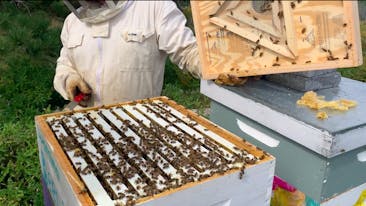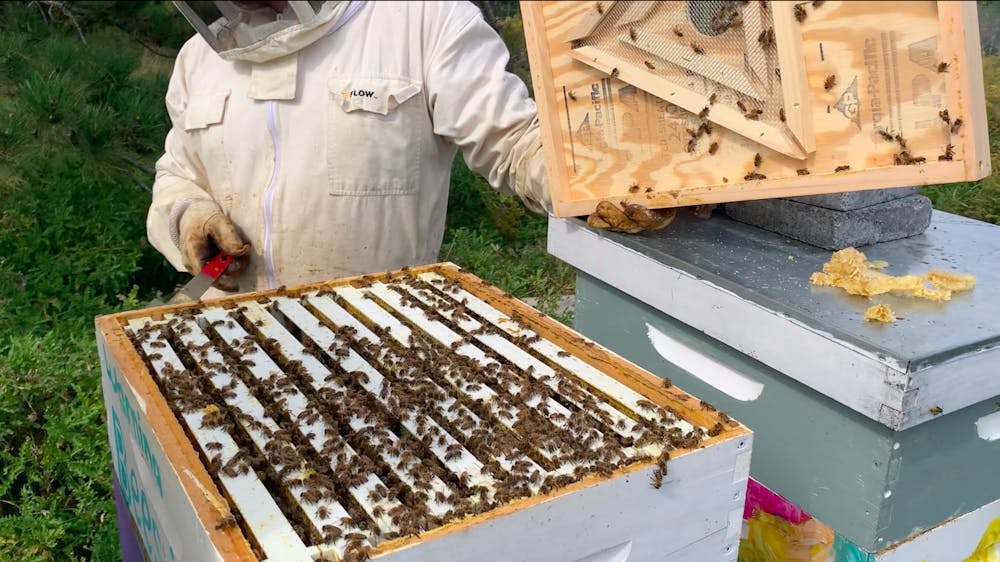In the winter of 2019, Noah Wichlacz was on a mission.
Wichlacz, then a freshman, was tending to his first ever beehive, a hobby born from his fascination with the science of beekeeping and his desire to try something new.
But, as the temperatures dropped to their seasonally cold lows, Wichlacz experienced the tragic loss of his entire hive, amidst the harsh Eden weather.
He says the experience motivated him to come back stronger the next winter, and taught him a number of lessons about beekeeping and life.
“The biggest thing that I have learned over my years is that the community behind beekeeping is much larger than I would have expected it to be, and most people are really nice and honestly just looking for advice on how to successfully manage colonies,” Wichlacz said in an interview with The Spectrum.

Wichlacz isn’t the only UB student with a fascination for his buzzing friends. UB Bees, a club dedicated to educating students about sustainability and science through beekeeping lectures, workshops and activities, started caring for hives in 2019. The organization was able to secure a $5,000 Honors College Research and Creativity Grant Fund for the project. UB Sustainability also supplied $1,000 in start-up funding and found a location for the hives by North Campus’ Crofts Hall. Today, UB Bees has 15 beekeeping suits and six hives to tend to.
“We are excited to see UB Bees continue to grow,” UB Sustainability engagement coordinator Derek Nichols said. “With their placement next to the campus garden, we want to solidify this area of campus as a mini-demonstration food system.”
UB Bees director David Hoekstra says putting resources toward sustainable practices like beekeeping is well worth the investment.
“On average, around 40% of honey bee hives do not survive the winter, and it is estimated that we’ve lost around 75% of insect biomass in the past 30 years,” Hoekstra said, as he explained the environmental benefits of beekeeping.
The student response has been “tremendous” so far, Hoekstra says. Hoekstra says prior to the pandemic, he would make weekly trips to the hive for winterizing, processing and upkeep. Now that there are more opportunities for students to get engaged in person, he is optimistic that the club will pick up steam.
“To be honest, I wasn’t sure whether holding hundreds or thousands of bees would help students de-stress,” Hoekstra said. “Yet everyone that has come out and left the hives feels rejuvenated and much more relaxed than when they enter, which is funny since having bees fly around you can BEE stressful.
“I think students benefit tremendously from getting out into a semi-wilderness area, experiencing nature/wildlife, and completely changing their mind and focus to handling bees (instead of the upcoming tests and papers), which is why it has been so helpful for so many students.”
Wichlacz says the act of beekeeping extends far beyond just extracting the honey.
“Once you get into bees, it’s almost like opening up a can of worms because you find out there’s so much you need to do,” Wichlacz said. “There’s so much research going on and there’s a pretty cool industry behind it that I don’t think most people realize.”
UB Bees hosted a honey bottling event last Wednesday in collaboration with UB’s Office of Student Engagement. Roughly 20 students were in attendance to write uplifting notes and package and bottle the honey for donation. The club donated over one hundred bottles of honey to Blue Table, UB’s virtual food pantry service. Hoekstra says the event “worked so efficiently that we were also able to bottle 100 additional jars of honey for sale to the community later on this fall.”
UB Bees is busy coming up with new ideas: new research projects, environmental awareness workshops and beeswax lip balm are all on the horizon. Hoekstra even plans on teaching a one credit module that focuses on pollinator biology next fall.
As for the bees?
“The vision is to find long-term funding from UB to support us,” Hoekstra said. “We hope to one day supply campus dining services with a healthy supply of honey to be used around campus.”
Jack Porcari is the senior news/features editor and can be reached at jack.porcari@ubspectrum.com

Jack Porcari is a senior news/features editor at The Spectrum. He is a political science major with a minor in journalism. Aside from writing and editing, he enjoys playing piano, flow arts, reptiles and activism.





